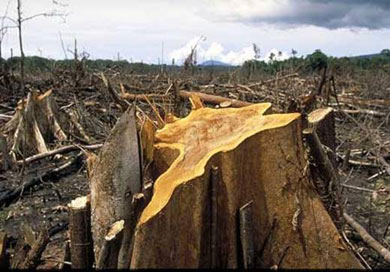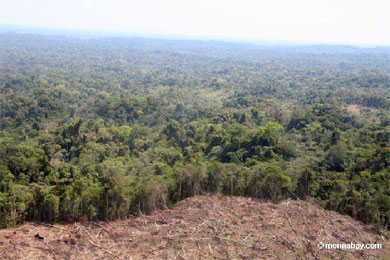Threats to rainforest ecosystems
As we have seen previously, rainforests are subjected to a range of natural disturbances, mainly due to cyclones and storm damage, but also drought, fire and volcanic eruptions are other natural processes that effect rainforest ecology. Human activities are increasingly having a major impact on tropical rainforest via deforestation and degradation (Figure 7, Figure 8). There are about 109 ha of tropical forests in the world and about 1% per annum is converted and degraded each year to other land uses, namely;
- slash-and-burn farming
- logging operations
- commercial farming
- cattle grazing
- firewood collection
- mining
- infrastructure development, especially roads

Figure 7 Forest clearing in PNG.
These activities can result in complete cover and biodiversity loss or more subtle effect from habitat fragmentation, fire risk, soil erosion and weed invasion. Climate change is also significant, as climate change will modify climate envelopes that rainforest ecosystems currently occupy, resulting in shifts in distributions and potentially large loss of species (Hibert et al. 2001).

Figure 8 Clearing rainforest in SE Peru for the Rio Huaypetue gold mine (Photo used with permission)
There is great uncertainty as to how climate will change in the tropics but warming and a reduction of rainfall is possible. While average rainfall may decline (or remain the same), climate change may alter the intensity and frequency of storms and cyclones, which will have significant impacts on the regeneration ecology of tropical rainforests. Sea-level rise could potentially have devastating impact on coastal rainforests and tropical mangrove forests.
Next topic - Case studies - Fire management in the Amazon
Topics in this module

